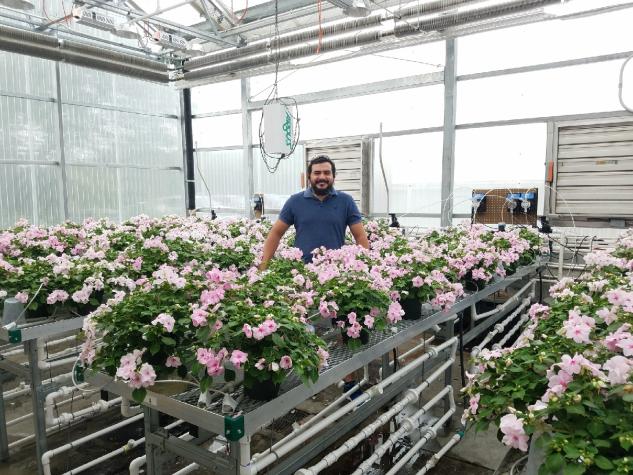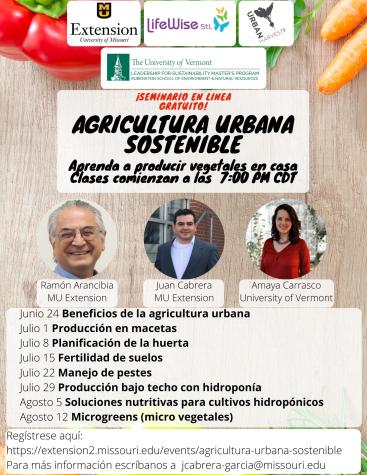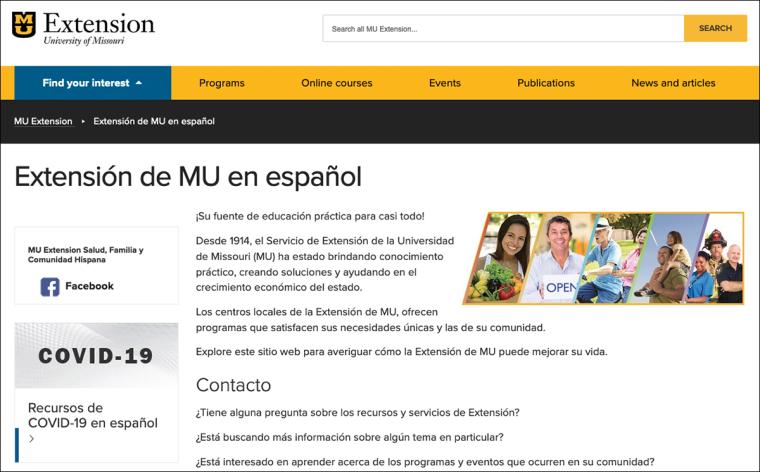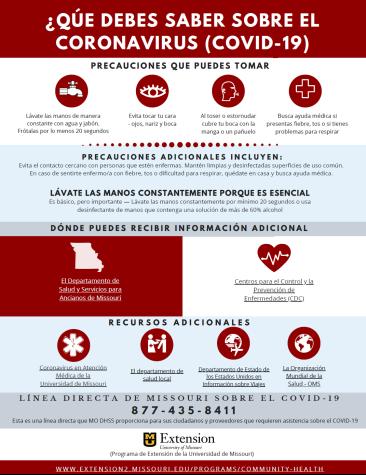MU Extension gardening webinar leads to growth of Spanish-language resources.
POPLAR BLUFF, Mo. – By population, the United States is the second-largest Spanish-speaking country in the world, according to the U.S. Census Bureau. Counting both bilingual and native speakers of Spanish, the U.S. has more people who can speak Spanish than Spain itself.
How do MU Extension specialists make sure they serve Missourians who speak Spanish?
“I first started doing a home gardening webinar series at the beginning of the year because of COVID-19 and potential food supply shortages,” said Juan Cabrera-Garcia, an MU Extension horticulture specialist in southeastern Missouri.
Amaya Carrasco, a St. Louis resident with experience in urban agriculture, asked him if he was going to offer the webinar in Spanish – something he had been thinking about himself.
So Cabrera-Garcia, Carrasco and Bates County horticulture specialist Ramon Arancibia developed a Spanish-language webinar series. More than 260 people registered for the series, including participants from Ecuador, Peru, Argentina, Brazil, Chile, Colombia, Puerto Rico, the Dominican Republic, Ecuador, Honduras and Japan, to name a few.
In a follow-up survey, Cabrera-Garcia discovered that 83% of participants had not heard of MU Extension before. For many of them, the webinar series was their first experience with extension offerings.
“I think during the pandemic people needed someone to be there for them,” Cabrera-Garcia said. “MU Extension, we were there for people when they needed us the most.”
The online course sparked interest in more Spanish-language content and expanded the team’s networking opportunities for creating more inclusive agriculture and environment education worldwide.
“I’ve been getting emails from extension specialists in other states and even from people outside of the country,” Cabrera-Garcia said. They asked if MU Extension had other Spanish-language resources and suggested teaming up to put together more webinars in Spanish. “I think there is an opportunity to collaborate with extension specialists, not just in Missouri.
Cabrera-Garcia said his team heard from instructors that the availability of MU Extension resources in Spanish has inspired programming in different areas of the world, including Ecuador and Peru.
“Educators in Ecuador emailed us saying they will use the knowledge gained from our classes to reach 8,000 families with African heritage in Esmeraldas, Ecuador,” Cabrera-Garcia said. “Their focus is to promote food security in the region. About 43% of the population has African heritage, and 85% of them live under the poverty line.”
Cabrera-Garcia said he never would have imagined the online programming would travel so far.
“We’re here to serve Missourians first. That’s one of the things we have to focus on,” he said. “But you never know who your programming is going to impact or just how far your efforts could reach when people start spreading the word.”
Specialists are translating vital MU Extension publications, resources and webpages into Spanish, including materials related to COVID-19.
“To keep our food supply chain safe, we knew that we had to translate our COVID-19 resources and materials,” he said.
Cabrera-Garcia hopes these efforts are just the beginning. Ultimately, he would like to be part of a nationwide network of extension specialists helping minority groups throughout the country.
“If we look at Hispanic farm owners or farm operators, they are usually small-scale farms,” he said. “We believe that if they have the right counseling, there is a potential that extension can help them grow and develop their farms.”
Farmworkers and workers in packing houses or meat processing plants also can benefit from MU Extension resources, Cabrera-Garcia said. Educating employees in the agriculture industry can reduce risks associated with handling food and other agricultural products. But the first step is to make sure “all Missourians are aware of MU Extension’s resources and that each individual has access to the materials we have to offer,” he said.
“In doing so,” he continued, “we are making sure that there’s a potential that we can increase the economic value of the agriculture sector in Missouri and, at the same time, we can ensure a safe and secure food supply. By doing these things, we are increasing the quality of life of everyone in Missouri.”
For more information on Cabrera-Garcia’s work and Extensión de MU en español, visit extension.missouri.edu/extension-de-mu-en-espanol.
Images available for this release:
Juan Cabrera-Garcia
Juan Cabrera-Garcia, MU Extension horticulture specialist in southeastern Missouri.
Flyer for Spanish-language webinar
Extensión de MU en español screenshot.
Extensión de MU en español screenshot
Flyer for Spanish-language webinar.
COVID-19 information sheet in Spanish
COVID-19 information sheet in Spanish.
Spanish version: Cultivando la Inclusividad
Writer: Ashley Craft



